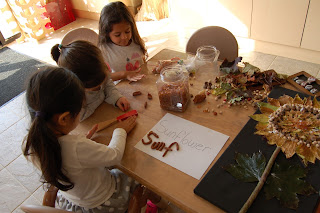The Hundred Languages of Teachers
We often reflect on The Hundred Languages of Children; the voices, competencies, manner in which children express their thoughts, theories and experiences.
But what of the teacher's languages, does she not have or require a hundred and a hundred more?
If we consider that each child learns in different ways then we must also consider that each teacher thinks and negotiates learning in different ways.
The truth is, and experience has taught me, that not every teacher can work in a Reggio Inspired, Inquiry Based, Emergent context.
I know that this thinking is going to ruffle some feathers. None the less it is a serious consideration.
I have mentored teachers for over 30 years and I've come to realize that this type of context is not for every educator.
Reggio inspired teachers must think outside the box; see possibility in all materials; challenge themselves to be researchers; negotiators; to be reflective; introspective; to be prepared for the day;
to live in the moment with the children; to form meaningful relationships with children and co teachers based on a genuine commitment to the process of inquiry; to be respectful of the environment.
Perhaps, most of all, she must see her career, not as a job, but as an extension of life.
Only then will the truest nature of Reggio be made visible!
But what of the teacher's languages, does she not have or require a hundred and a hundred more?
If we consider that each child learns in different ways then we must also consider that each teacher thinks and negotiates learning in different ways.
The truth is, and experience has taught me, that not every teacher can work in a Reggio Inspired, Inquiry Based, Emergent context.
I know that this thinking is going to ruffle some feathers. None the less it is a serious consideration.
I have mentored teachers for over 30 years and I've come to realize that this type of context is not for every educator.
Reggio inspired teachers must think outside the box; see possibility in all materials; challenge themselves to be researchers; negotiators; to be reflective; introspective; to be prepared for the day;
to live in the moment with the children; to form meaningful relationships with children and co teachers based on a genuine commitment to the process of inquiry; to be respectful of the environment.
Perhaps, most of all, she must see her career, not as a job, but as an extension of life.
Only then will the truest nature of Reggio be made visible!














Comments
Post a Comment